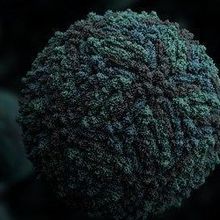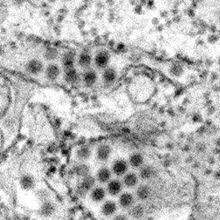dengue virus

DNA-Delivered Antibodies Fight Off Lethal Bacterial Infection
Catherine Offord | Oct 3, 2017 | 4 min read
Mice receiving the treatment produced their own monoclonal antibodies and survived infection with the life-threatening pathogen Pseudomonas aeruginosa.

Dengue Infection Impairs Immune Defense Against Zika
Catherine Offord | Aug 18, 2017 | 4 min read
A memory B cell response to Zika virus in dengue-infected patients produced antibodies that were poorly neutralizing in vitro and instead enhanced infection.

A Triple Threat
Ashley P. Taylor | May 22, 2017 | 2 min read
The mosquitoes that carry Zika may be able to transmit two other viruses at the same time.

Wolbachia-infected Mosquitoes Released in Florida
Kerry Grens | Apr 19, 2017 | 1 min read
The bacterium causes eggs to die, and spreading treated insects is expected to curb Aedes aegypti populations.

Anti-Flavivirus Antibodies Enhance Zika Infection in Mice
Anna Azvolinsky | Mar 30, 2017 | 3 min read
Researchers report evidence of antibody-dependent enhancement in a Zika-infected, immunocompromised mouse model.

Bacteria-Treated Mosquitoes Released in More Locations
Kerry Grens | Jan 17, 2017 | 2 min read
Infected with Wolbachia, the insects are expected to reduce the spread of dengue and Zika. But scientists say the approach may have limitations.

GM Mosquitoes Reduce Dengue Cases in Brazil
Jef Akst | Jul 18, 2016 | 1 min read
Field data from the biotech company Oxitec show that releasing genetically modified male mosquitoes whose offspring die helped reduce dengue cases by 90 percent in one year.

Zika Update
Tanya Lewis | Jul 14, 2016 | 2 min read
Epidemic may be peaking and could end within three years, scientists suggest; dengue antibodies enhance risk of Zika infection; considering new strategies for the control of mosquito-borne disease outbreaks

Zika and Dengue Immunity: A Complex Relationship
Amanda B. Keener | Jun 28, 2016 | 3 min read
Researchers examine the blood of people infected with dengue virus, finding a few Zika-neutralizing antibodies among mostly enhancing ones.

Speaking of Microbiology
Tanya Lewis and Tracy Vence | Jun 21, 2016 | 2 min read
A selection of notable quotes from the American Society for Microbiology’s annual meeting

Oropouche Outbreak in Peru
Tanya Lewis | Jun 6, 2016 | 1 min read
The viral infection causes symptoms similar to those associated with Zika and dengue viruses.

Bacterium Blocks Zika’s Spread
Tanya Lewis | May 4, 2016 | 3 min read
Infecting mosquitoes with Wolbachia greatly reduces the insects’ abilities to transmit the virus.

Dengue Antibodies Enhance Zika Infection?
Tanya Lewis | Apr 28, 2016 | 1 min read
Previous flavivirus infection could help explain the severity of symptoms in some people infected during the ongoing Zika outbreak, researchers report.

Speaking of Science
The Scientist | Mar 1, 2016 | 2 min read
March 2016's selection of notable quotes

Mutant Mosquitoes Deployed to Stop Zika, Dengue
Kerry Grens | Jan 19, 2016 | 1 min read
A Brazilian town will ramp up the release of insects engineered to shrink mosquito populations.

First Dengue Vax Approved
Kerry Grens | Dec 11, 2015 | 2 min read
Mexico’s health ministry has OKed the vaccine for people between nine and 45 years old.

New Virus Discovered in Human Blood
Jef Akst | Sep 23, 2015 | 2 min read
Researchers identify a novel virus in blood samples taken in the 1970s.

Dengue’s Downfall?
Jef Akst | Sep 15, 2015 | 2 min read
Researchers characterize a protein that could be key to the virus’s virulence—and to developing a vaccine against the mosquito-borne disease.

Dengue-Targeting T Cells Home to Skin
Jenny Rood | Mar 11, 2015 | 3 min read
Immune cells specific for the virus are present in the skin of infected patients, a study shows.

New Dengue-Detecting Antibodies
Molly Sharlach | Dec 15, 2014 | 3 min read
Researchers uncover a class of antibodies that may confer immunity to different serotypes of the dengue virus.